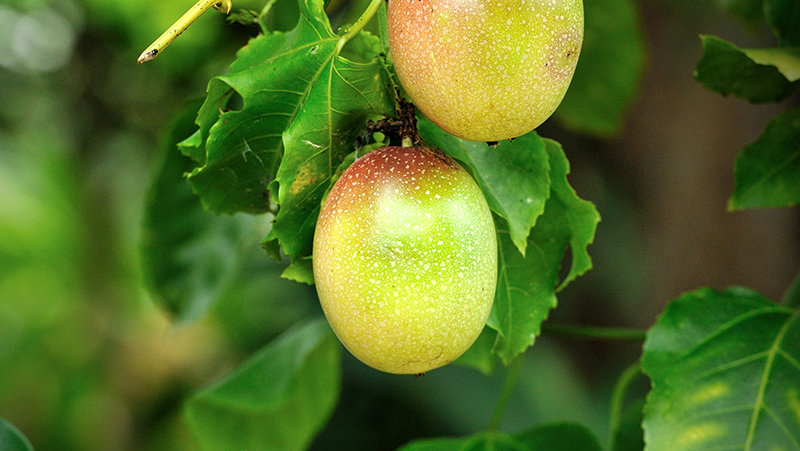Yates Account
Join now
Create a Yates account today!
Sign up to join the Yates Garden Club for monthly e-mails packed with seasonal inspiration, tips for success & exclusive promotions.
Plus if you’re a Garden Club member you can take part in the Yates Growing Community - a blog to share successes, get advice & win prizes in fun challenges along the way!

Forgot password
Enter the email address associated with your account, and we'll email you a new password.

Passionfruit are one of the most bountiful backyard crops, and spring is a good time to get started with planting a new vine or to give one that’s already growing a helping hand. We take the worry out of growing this popular backyard crop with these tips. They need a warm, sunny, sheltered spot with fertile soil and regular water to thrive. Plant a passionfruit vine between spring to early autumn and provide it with a wall or framework to climb on.
- Passionfruit thrive in subtropical and temperate regions.
- An ideal spot to grow a vine is along a wire fence, across a balcony, or over a pergola.
- It can take 12–18 months for a newly planted vine to reach fruiting size.
- Prune vines to control their size and spread, and to allow sunlight to filter through and help ripen fruit.
- The wrinkled fruit contains vitamins A and C, potassium and iron, and is good for salads, desserts and in drinks. The passionfruit pulp can be bottled, made into sauce or eaten fresh.
Where to start
Feed and Water
Keep hungry passionfruit vines well-watered (especially when there’s little rain) and fed from spring to autumn. Use Yates Thrive Citrus & Fruit Granular Plant Food to nourish your plants. Water plants well before adding fertiliser then spread it around the base of the stem and along the area where the roots are growing. Be sure to remove any weeds that start to grow near your plant by hand.
Look out for suckers
Many passionfruit are grafted plants. From time to time the root system your vine is grafted on starts to grow. It can out grow the productive vine and cause it to become weedy. Always remove suckers from below the graft area and avoid damaging the root system as this can encourage suckering.
Pruning your passionfruit
Passionfruit vines don’t require pruning to encourage fruiting, but they may need a trim from time to time to remove overgrown growth. They can become quite heavy so ensure the area its climbing can bear the weight. The best time to prune is in spring as new growth resumes. Do avoid removing main stems, just cut back unwanted twining stems.

Passionfruit not producing?
You can expect fruit about 18 months after planting. If your vine is not fruiting after this time, it may be due to one of the following reasons.
- It needs more water. Passionfruit vines are heavy feeders and need plenty of water. A dry plant will not produce fruit, so ensure the soil is moist.
- Heavy rain during the flowering phase can ruin the viability of the pollen and cause a lack of bees for pollination. You can self pollinate using a small paintbrush or toothbrush to transfer pollen from one flower to another.
- Overfertilising results in flowers but no fruit. Passionfruit usually only needs fertilising twice a year, after pruning and again after fruiting.
- 6 hours of sunshine. Passionfruit require at least six hours of direct sunshine a day. They should be planted in a sunny spot with no trees or competitive roots.
Passionfruit fruit is empty?
This can be caused by overfeeding or a result of weak seedlings. Follow the fertilising guide on pack and if the issue continues it may mean that you need to start again from scratch.
Passionfruit is falling off before it’s mature?
This can be caused by extreme cold weather or the plant not getting enough water. If the soil around your plant is dry the fruit may shrivel and fall prematurely. Be sure to water frequently in short intervals in dry times to keep it growing and healthy.
Passionfruit fallen from the vine?
Storms can certainly play havoc when they hit, especially in the garden. If your passionfruit has dropped its fruit due to a storm and the fruit is still green, then, unfortunately, they are unlikely to sweeten up.
You would normally pick the fruit when it has changed from green to purple thus allowing as much time as possible for the fruit to mature and ripen on the vine.
All is not lost, your vine will produce again next year, so come spring, fertilise the vine with some Yates Thrive Citrus & Fruit Granular Plant Food to encourage flowering and fruiting. Give ample moisture to the vine during the hot summer months and next summer/autumn your vine will reward you with lots of delicious sweet fruits.














Share
Share this article on social media